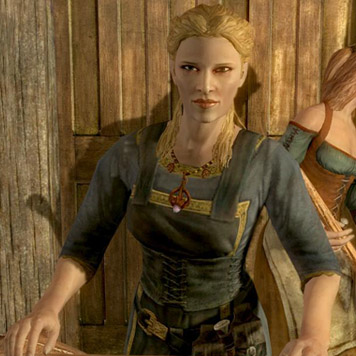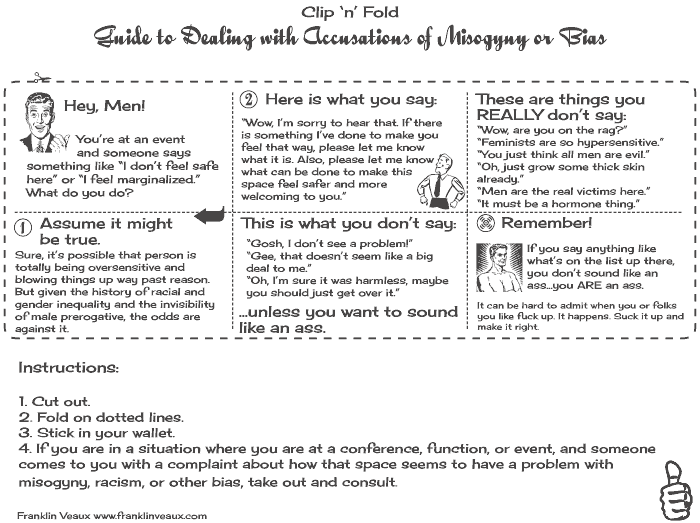Unless you’ve spent the last year living entirely under a rock, far from the hustle and bustle of normal life, and entirely without any sort of Internet connection, you’re probably aware to some extent of a rather lengthy fuss about the heart and soul of computer gaming. This fuss, spearheaded by a diverse group of people loosely gathered under a name whose initials are similar to GargleGoose, is concerned about the future of comic book and video game entertainment. They believe that a sinister, shadowy cabal of “social justice warriors”–folks who are on a mission to, you know, right wrongs and uplift the oppressed, kind of the way Batman or Superman do only without the fabulous threads. This cabal, they fear, is coming for their video games. The social justice warriors, if we are to believe GameteGoose, are so obsessed with political correctness that they wish to make every game in the world a sanitized, sterile sandbox where not the slightest whisper of sex or violence may be seen.
Okay, so granted that’s not likely the characterization GrizzleGoose would put to their aims, though I think the general gist is there.
And they’re not entirely wrong, though they’re pretty far from right. There is a battle going on for the heart and soul of entertainment. For decades, comic books and video games have catered to straight white middle-class guys, who overwhelmingly make up the demographic that bought the games, read the comics, and to whom writers, artists, and developers catered with laser focus.
But times have changed, comics and games have gone mainstream, and they’re attracting more and more people who aren’t straight white dudes any more. And as other folks have come into the scene, they have started pointing out that some of the tropes that’ve long been taken for granted in these media are, well, a little problematic.
And merely by pointing that out, the folks talking about these problematic things have provoked pushback. When you live in a world where everyone caters to your exact tastes, the idea that some people might start making some things that aren’t to your liking feels like a betrayal. And the suggestion that there might be something about your taste that isn’t quite right? Well, that can quickly turn into an existential threat.
GooeyGoose has effectively capitalized on that existential threat, rallying straight white dudes into believing they’re the Rebel Alliance who are under attach from the forces of social justice while adroitly handwaving away the reality that when it comes to popular taste in entertainment media, straight white middle-class dudes are and have always been the hegemonizing Empire.
But here’s the thing. You can point out that popular entertainment media is problematic without saying the people who like it are bad people.

I play Skyrim.
Skyrim is an open-world role-playing game where the player takes on the persona of a mythic hero trying to save a world plagued by dragons, a civil war, and the restless undead. It’s almost entirely unstructured, with players having the ability to choose to do just about Anything. Non-player characters the player interacts with offer advice and provide quests, which the player can choose whether or not to do.
It’s a lot of fun to play. I’ve lost quite a number of hours of my life to it, fighting dragons, deciding which side of the civil war to support, participating in political intrigue, exploring creepy dungeons, and exploring a lush and richly detailed world.
It also has some problematic issues.

This is Haelga, one of the characters in the game. The player can be given a minor side quest in the game by her niece, who works for Haelga but doesn’t like her very much. Haelga’s niece, Svana Far-Shield, tells the player that Haelga is having sex with several different men, and wants the player to get proof in order to shame and humiliate Haelga.
The way the quest is written, it’s sex-negative as hell. It plays to just about every derogatory trope out there: open female sexuality is shameful, women who are perceived as sexual are “sluts,” and pouncing on a woman with evidence of her sexual attitude is a sure way to humiliate (and therefore control) her.
You might argue that Skyrim is set in a time that is not as enlightened as the modern-day West, but that ignores a very important reality: Skyrim is set in a time and place that never existed. There’s no compelling reason to write sex-negativity into the script. The game works well without it. It’s there not because the distant faux-medieval past was sex-negative, but because modern-day America is.
But that, too, misses a point, and it misses the same point the GiggleGoose folks miss:
It is possible to recognize problematic elements of a game and still enjoy the game.
I recognize that this quest in Skyrim is sex-negative, and that’s a problem. I still like the game.
The people who play these games and read these comic books are not bad people for doing so. The content of the games and comics is troubling to anyone who cares about people other than straight white middle-class men, sure, and it’s certainly reasonable to point these things out when they occur (though they happen so damn often that one could easily make a full-time career of pointing them out). That doesn’t make the people who like them Bad And Wrong simply because they enjoy them.
GiddyGoose believes that saying video games are a problem is the same thing as saying people who enjoy video games are a problem. And if you identify with comic books and video games so strongly that you can not separate your entertainment media from your sense of self, they might be on to something.
But most folks, I think, are able to take a deep breath, step back a half pace, and recognize that the writers and developers have done some really cool, fun stuff, but they can still do better. It would not kill anyone if the quest in Skyrim were rewritten (how about have Haelga’s character replaced by a man? There’s a thought…), or even dropped entirely. Nobody suffers from recognizing that it’s not cool to make fun of people who aren’t like you.
Nobody’s saying that Skyrim shouldn’t exist, or that people who play it are terrible people. I would like to think, on my optimistic days, that that’s an idea anyone smart enough to work a computer can recognize.

 If you live in the US, odds are pretty good that anyone who wants to talk morality with you is actually talking about sex. How to do it, where to do it, when to do it, in what position to do it, who to do it with…the term “morals,” especially in political discourse, has come to be a synonym for “sex.”
If you live in the US, odds are pretty good that anyone who wants to talk morality with you is actually talking about sex. How to do it, where to do it, when to do it, in what position to do it, who to do it with…the term “morals,” especially in political discourse, has come to be a synonym for “sex.”  Take Pat Robertson.
Take Pat Robertson.  When this image dominates the public dialog about morality, someone is being snookered.
When this image dominates the public dialog about morality, someone is being snookered. But the media attention about Chick-Fil-A and gay marriage got me to thinking. Most self-described Christian conservatives base their opposition to gay marriage on two Bible verses. Leviticus 18:22 reads:
But the media attention about Chick-Fil-A and gay marriage got me to thinking. Most self-described Christian conservatives base their opposition to gay marriage on two Bible verses. Leviticus 18:22 reads:

 It was no picnic for me growing up there. I was the stereotypical geek as a kid; I was into model rocketry, and I owned a TRS-80 computer, the only computer of any sort in a 40-mile radius. (I know this because the only other computer within any distance was an Apple II belonging to the owner of the business my mother worked at in the next town over, about 45 minutes away; he used it to do bookkeeping.)
It was no picnic for me growing up there. I was the stereotypical geek as a kid; I was into model rocketry, and I owned a TRS-80 computer, the only computer of any sort in a 40-mile radius. (I know this because the only other computer within any distance was an Apple II belonging to the owner of the business my mother worked at in the next town over, about 45 minutes away; he used it to do bookkeeping.) After my first year in college, I made a conscious decision: I did not want to be introverted or shy any more. I deliberately and systematically set about learning the skills that would get me there. I started choosing different kinds of people in my social circle. If I found a social situation that made me uncomfortable, I deliberately kept putting myself in it.
After my first year in college, I made a conscious decision: I did not want to be introverted or shy any more. I deliberately and systematically set about learning the skills that would get me there. I started choosing different kinds of people in my social circle. If I found a social situation that made me uncomfortable, I deliberately kept putting myself in it. In the 1990s, which is positively antediluvian as far as the Internet goes, I started working on a Web site. (The Wayback Machine only started capturing the poly section of the site in 2000, for reasons I don’t completely understand.)
In the 1990s, which is positively antediluvian as far as the Internet goes, I started working on a Web site. (The Wayback Machine only started capturing the poly section of the site in 2000, for reasons I don’t completely understand.) When a person wears a wedding ring and says in casual conversation “My wife and I went to dinner last night,” that person is validating those social conventions. He could say that it’s nobody’s business how he conducts his romantic affairs, of course; but the simple act of wearing a wedding ring is a public declaration of a very specific kind of relationship. And it’s hard to talk about the things we do, even casually, without talking about the people we do them with, and what those people’s relationships are to us.
When a person wears a wedding ring and says in casual conversation “My wife and I went to dinner last night,” that person is validating those social conventions. He could say that it’s nobody’s business how he conducts his romantic affairs, of course; but the simple act of wearing a wedding ring is a public declaration of a very specific kind of relationship. And it’s hard to talk about the things we do, even casually, without talking about the people we do them with, and what those people’s relationships are to us. Apparently, a prominent blogger named Rebecca Watson was harassed at TAM last year. And the fallout from her complaint about it, which I somehow managed to miss almost entirely, are still going on.
Apparently, a prominent blogger named Rebecca Watson was harassed at TAM last year. And the fallout from her complaint about it, which I somehow managed to miss almost entirely, are still going on.